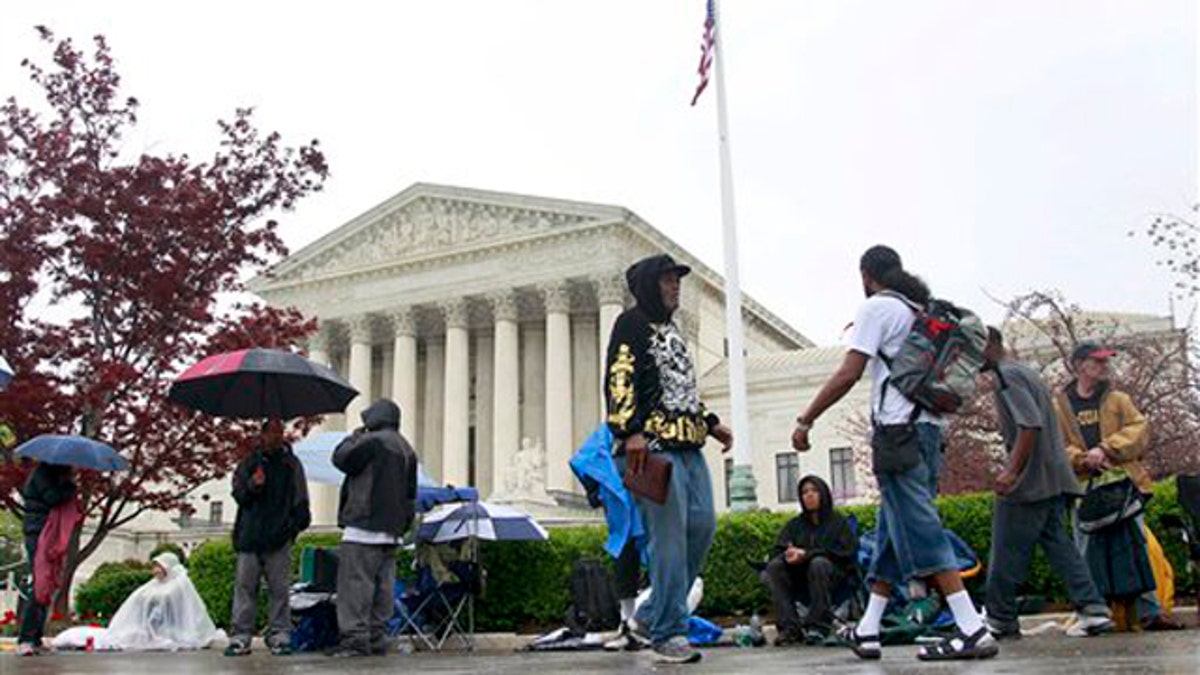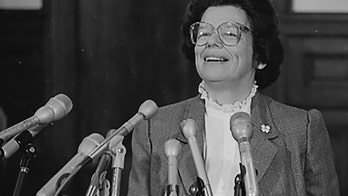
March 24, 2012: People walk in front of the Supreme Court as others form a line, in advance of arguments regarding the federal health care overhaul challenge. (AP)
Imagine the captains of two Super Bowl teams meeting at midfield inside a stadium full of rabid fans waiting for the coin toss. Except the coaches are arguing with the refs over whether the footballs are in compliance.
The refs finally conclude they are not, and postpone the game. Nobody wins. Everybody goes home, grumbling about a missed opportunity.
The first day of hearings Monday at the Supreme Court over the federal health care overhaul risks this kind of unsatisfying outcome.
For all the anticipation leading up to this week's historic arguments, Monday morning's opener at the Supreme Court isn't about the law itself. It's about the rules of the game.
With hearings now under way, the day may prove disappointing to anyone looking for a vigorous constitutional argument or a hint of how the justices will ultimately rule on the merits of the dispute.
Still, the fate of the case rests on this opening round.
This first issue before the justices is whether an obscure 1867 tax law prohibits lawsuits, like the ones challenging the health care law, from going forward until someone actually pays the insurance tax penalty -- the penalty for not buying health insurance, as required under the law.
It's a question over whether the high-profile lawsuits can proceed now or will have to wait until early 2015 when the IRS collects its first payments from uninsured taxpayers. In other words, will the justices -- playing the role of referees -- call off this Super Bowl of legal cases on a technicality?
Though unlikely, it is possible that the Court could issue a ruling saying the Reconstruction-era Anti-Injunction Act (AIA) forecloses action on the other health care cases. That was the conclusion reached by the Fourth Circuit U.S. Court of Appeals in a pair of cases started by Virginia lawmakers and Liberty University challenging the law. It was an unexpected ruling from the Richmond-based court as most of the arguments focused on the constitutional merits of the legislation. No other court has reached the same decision, though Judge Brett Kavanaugh of the D.C. Circuit focused his dissent on this issue. "Deciding the constitutional issues in this case at this time would contravene an important and long-standing federal statute," Kavanaugh wrote last year.
Such a decision at the Supreme Court would effectively punt the ball for at least three more years.
By that time, unless Congress repeals the health care law (something that nearly every Republican lawmaker wants to accomplish), the full scale of the Affordable Care Act (ACA) will be in effect.
But several veteran observers of the Supreme Court think such a ruling is unlikely given how the justices have structured the cases they will hear.
In an unusual sign of agreement, all parties involved in the case agree, albeit for different reasons, that the law doesn't preclude the justices from moving forward.
The key provision of the AIA statute says "no suit for the purpose of restraining the assessment or collection of any tax shall be maintained in any court." The law helps protect the government from frivolous lawsuits against its tax policies until after a tax has already been imposed and collected.
But the ACA doesn't speak of a "tax" for noncompliance -- rather a "penalty" that's to be enforced by the IRS. A House version of the health care law that was eventually abandoned did use the word tax but the Senate bill that became the law assesses a penalty for taxpayers who don't comply with the mandate. In an interview before the law was passed, President Obama strongly objected to any suggestion it's a tax.
Paul Clement is the top lawyer for the 26 states challenging the health care law and told the Court that the overriding legal challenge is to the individual mandate -- not the tax penalty that enforces the mandate -- thus making the AIA inapplicable to his case. "The two are distinct provisions with distinct exemptions," he said.
It's a line of argument also addressed by Michael Carvin representing the National Federation of Independent Businesses and several private citizens. "The individual mandate is a substantive legal requirement that cannot possibly be characterized as a 'tax' and that exists independently of the ACA's non-compliance penalty," he said.
The government also argues the case should proceed to a final judgment, though it took the opposite view during earlier litigation before the trial court. Now it says challenges to the ACA aren't barred because of the tax law.
"A 'penalty' is not the same thing as a 'tax' for statutory purposes under the Internal Revenue Code," Solicitor General Don Verrilli wrote in his brief.
The Court has appointed Washington D.C. lawyer Robert Long to argue the case for invoking the AIA. Outside counsel is occasionally appointed by the court when a legal position is abandoned or otherwise left alone by the litigants. Long told the justices that the health care law's mandate penalty "falls within the ordinary meaning of 'tax' because it is codified in the (IRS) Code, calculated as part of the taxpayer's federal income tax liability, assessed and collected by the IRS, and paid into the federal government's general revenues."
While there are some who fear the high court will accept this argument, knowledgeable court observers have told Fox News they think the manner in which the court scheduled its line-up of cases this week suggests this escape hatch will not be used. They think it's unlikely that at least five justices will hear Monday's case, conclude that the challenges to the health care law are premature, then sit through four-and-a-half more hours of arguments over the next two days when the issue, at least in their minds, is already settled on technical grounds.
Furthermore, the thinking goes, if that's the direction the Court is leaning, the justices would have more likely announced that they would hear just this one issue -- and delay hearing the other matters until they ruled the AIA isn't applicable, or if it is, wait until 2015.
The transcript of the day's oral arguments and an audio recording from inside the courtroom will be posted on the Supreme Court's website in the early afternoon.




